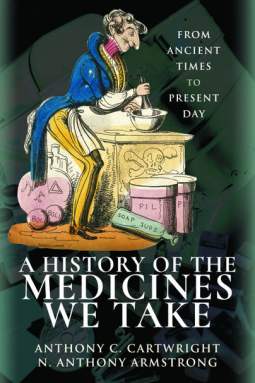
A History of the Medicines We Take
From Ancient Times to Present Day
by N. Anthony Armstrong, Anthony C. Cartwright
This title was previously available on NetGalley and is now archived.
Buy on Amazon
Buy on BN.com
Buy on Bookshop.org
*This page contains affiliate links, so we may earn a small commission when you make a purchase through links on our site at no additional cost to you.
Send NetGalley books directly to your Kindle or Kindle app
1
To read on a Kindle or Kindle app, please add kindle@netgalley.com as an approved email address to receive files in your Amazon account. Click here for step-by-step instructions.
2
Also find your Kindle email address within your Amazon account, and enter it here.
Pub Date Apr 30 2020 | Archive Date Feb 03 2020
Pen & Sword | Pen & Sword History
Talking about this book? Use #AHistoryoftheMedicinesWeTake #NetGalley. More hashtag tips!
Description
A HISTORY OF THE MEDICINES WE TAKE gives a lively account of the development of medicines from traces of herbs found with the remains of Neanderthal man, to prescriptions written on clay tablets from Mesopotamia in the third millennium BC, to pure drugs extracted from plants in the nineteenth century to the latest biotechnology antibody products.
The first ten chapters of the book in PART ONE give an account of the development of the active drugs from herbs used in early medicine, many of which are still in use, to the synthetic chemical drugs and modern biotechnology products. The remaining eight chapters in PART TWO tell the story of the developments in the preparations that patients take and their inventors, such as Christopher Wren, who gave the first intravenous injection in 1656, and William Brockedon who invented the tablet in 1843. The book traces the changes in patterns of prescribing from simple dosage forms, such as liquid mixtures, pills, ointments, lotions, poultices, powders for treating wounds, inhalations, eye drops, enemas, pessaries and suppositories mentioned in the Egyptian Ebers papyrus of 1550 BCE to the complex tablets, injections and inhalers in current use. Today nearly three-quarters of medicines dispensed to patients are tablets and capsules. A typical pharmacy now dispenses about as many prescriptions in a working day as a mid-nineteenth- century chemist did in a whole year.
Available Editions
| EDITION | Paperback |
| ISBN | 9781526724038 |
| PRICE | £12.99 (GBP) |
Links
Readers who liked this book also liked:
Sounds Like a Plan
Pamela Samuels Young; Dwayne Alexander Smith
Multicultural Interest, Mystery & Thrillers, Romance
Pamela Samuels Young; Dwayne Alexander Smith
Multicultural Interest, Mystery & Thrillers, Romance


















